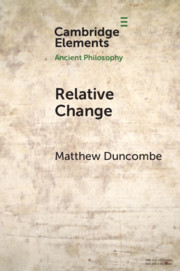Element contents
Relative Change
Published online by Cambridge University Press: 17 September 2020
Summary
Information
- Type
- Element
- Information
- Series: Elements in Ancient PhilosophyOnline ISBN: 9781108581660Publisher: Cambridge University PressPrint publication: 08 October 2020
References
Accessibility standard: Unknown
Why this information is here
This section outlines the accessibility features of this content - including support for screen readers, full keyboard navigation and high-contrast display options. This may not be relevant for you.Accessibility Information
- 12
- Cited by
